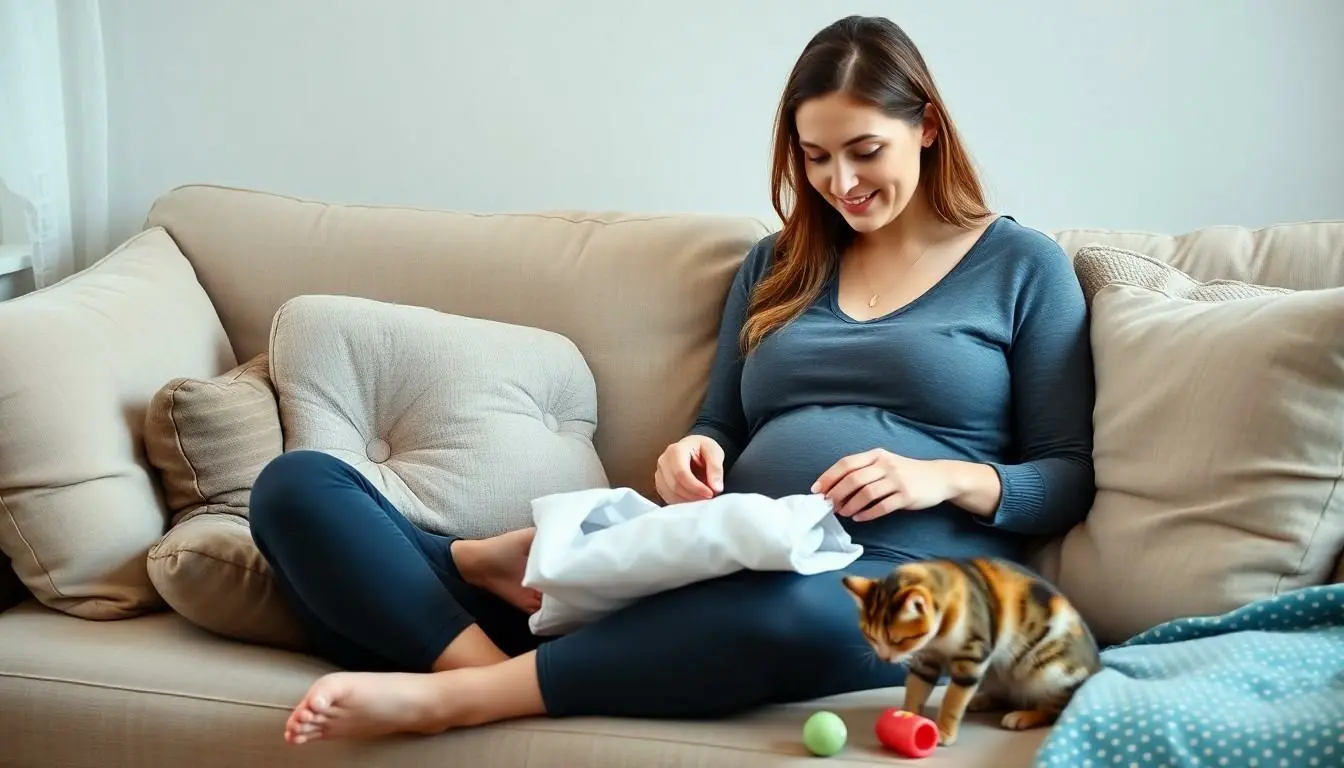Cats have a reputation for being mysterious creatures, but when it comes to sensing pregnancy, they might just be the furry fortune tellers we didn’t know we needed. Ever noticed your feline friend acting a bit strange around you? Maybe they’re suddenly more affectionate or keeping a watchful eye on your every move. It turns out, they might be picking up on those subtle changes in your body and behavior that signal a little one on the way.
Table of Contents
ToggleOverview of Cat Sensory Abilities
Cats possess extraordinary sensory abilities that enable them to detect changes in their environment. Their keen sense of smell plays a critical role in this capacity, as cats have about 50 to 80 million olfactory receptors, compared to humans’ roughly 5 million. These receptors allow cats to pick up on hormonal changes in pregnant individuals.
Vision also contributes to a cat’s understanding of their surroundings. Cats see well in low light, due to a higher number of rod cells in their retinas. This adaptation helps them notice subtle shifts in body language or behavior, particularly during significant life changes like pregnancy.
Hearing proves another crucial element. Cats can hear a broader range of frequencies, from 48 Hz to 85 kHz. This heightened hearing allows them to detect sounds related to emotional shifts or physical changes, providing more context about their owner’s situation.
Behavioral changes may arise as cats respond to these sensory cues. Increased clinginess or protective behavior often occurs when a cat senses that its owner is pregnant. They may follow their owner closely or show heightened vigilance, as a means to offer support or protection.
Additionally, the ability to recognize scent and sound varies among individual cats. Some may demonstrate stronger instincts than others, leading to noticeable differences in responses to pregnancy. Variations in temperament influence how they interact with a pregnant person, showcasing the uniqueness of each cat’s sensory perception.
Understanding Pregnancy in Humans

Pregnancy involves a series of significant physical and emotional transformations in humans. These changes often affect both the individual and their environment, including pets.
Physical Changes During Pregnancy
Hormonal fluctuations drive substantial physical changes during pregnancy. These shifts can result in weight gain, swelling, and changes in body shape. Commonly, fatigue increases, and morning sickness often occurs in the first trimester. Changes extend to skin texture, due to varying hormone levels, which might lead to a glow or, conversely, blemishes. Increased blood volume and circulation can result in heightened body temperature. Many women experience cravings or aversions to certain foods. These combined physical transformations alter daily routines and interactions with pets.
Behavioral Changes During Pregnancy
Pregnancy often leads to noticeable behavioral changes. Mood swings commonly arise from hormonal fluctuations, affecting emotional stability. Increased sensitivity to smells and sounds may develop, causing discomfort in previously non-irritating environments. Engagement in nesting behaviors, such as organizing the home, typically grows during this period. As the pregnancy progresses, individuals may seek more rest and relaxation, impacting social interactions. Adjustments in priorities and focus on preparing for the new arrival can shift how one interacts with pets. These emotional and behavioral adjustments can influence how cats perceive and respond to their pregnant owners.
Do Cats Sense Pregnancy?
Cats may exhibit distinct behaviors indicating their awareness of a pregnancy in their owners. Changes in behavior often arise as cats respond to physical and emotional transformations that occur during this time.
Evidence from Animal Behavior Studies
Research demonstrates that animals recognize alterations in their human companions’ physiological states. A study found that pets often react to hormonal shifts common in pregnancy. Behavioral responses can include increased attachment and protective instincts. Additionally, heightened sensory perception, particularly smell, plays a critical role. Cats possess 50 to 80 million olfactory receptors, allowing them to detect subtle hormonal changes. These scientific insights suggest a significant correlation between a cat’s behavior and its owner’s pregnancy status.
Anecdotal Evidence from Cat Owners
Many cat owners report noticeable behavioral shifts in their pets when expecting a child. Increased clinginess is a common observation. For instance, some cats may follow their owners more closely or seek out extra affection. Protective actions, like sitting near the pregnant individual, highlight their awareness. Owners also share stories of their cats becoming more vocal or displaying curiosity about changes in the household. Such anecdotes reinforce the idea that cats perceive and react to emotional and physical cues tied to pregnancy.
The Science Behind Cats’ Senses
Cats possess remarkable sensory abilities that enable them to perceive changes in their environment, including those associated with human pregnancy. Their acute senses play a crucial role in understanding these shifts.
Smell and Chemical Changes
Cats utilize their exceptional sense of smell to detect subtle changes in their owner’s body chemistry. With 50 to 80 million olfactory receptors, their sense of smell surpasses that of humans, who have only 5 million. Hormonal fluctuations during pregnancy release distinct scents, which cats can identify. These changes in pheromones and hormones trigger various reactions. Pregnant individuals often emit new odors that can capture a cat’s attention, making them more aware of their owner’s condition.
Behavioral Reactions to Pregnancy
Cats exhibit notable behavioral changes in response to their owner’s pregnancy. Increased clinginess or protectiveness reflects their awareness of shifts in emotional states. Owners often experience fatigue, mood swings, and altered routines, leading to heightened attention from cats. Cats’ adaptations may manifest as additional vocalizations, enhanced curiosity, or even attempts to nest alongside their owners. Such observations underline the bond between cats and their human companions, further reinforcing the idea that cats respond to their owners’ well-being.
Implications for Cat Owners
Understanding how cats sense pregnancy can help owners prepare for changes in their feline companions. Effective preparation ensures a harmonious environment for both the cat and the new baby.
Preparing Your Cat for a New Baby
Familiarizing the cat with new baby sounds and smells starts early in the pregnancy. Introducing items like baby blankets and clothes allows the cat to explore these items before the baby arrives. Gradually changing routines, such as feeding times, can provide a sense of stability. Providing a quiet space for the cat helps reduce anxiety during this transition. Engaging in interactive playtime strengthens the bond, ensuring the cat feels secure amid changes. Familiarity with baby equipment, such as cribs and strollers, promotes a sense of acceptance.
Ensuring a Smooth Transition
Establishing boundaries early prepares the cat for the arrival of the baby. Training the cat to stay out of certain areas, like the nursery, reduces potential conflicts. Monitoring the cat’s behavior as the due date approaches enables owners to respond proactively to stress signals. Offering extra attention and comfort reassures the cat, lessening feelings of jealousy. Consistent routines after the baby’s arrival encourage a sense of normalcy. Gradual introductions between the cat and newborn, always supervised, help build a positive relationship from the start.
Cats possess remarkable abilities that allow them to sense changes in their owners during pregnancy. Their heightened senses enable them to pick up on hormonal shifts and emotional states, leading to noticeable behavioral changes. These adaptations can enhance the bond between cats and their human companions during this transformative time.
As expectant parents navigate the complexities of pregnancy, understanding their cat’s reactions can help foster a harmonious environment. By preparing cats for the arrival of a new baby and maintaining routines, owners can ensure a smoother transition. Ultimately, recognizing the unique connection between cats and their pregnant owners can enrich both their lives as they prepare for the new addition to the family.
